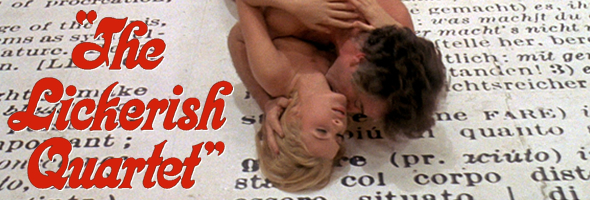
Color, 1970, 90m.
Directed by Radley Metzger
Starring Silvana Venturelli, Frank Wolff, Erika Remberg, Paolo Turco
Arrow (Blu-Ray & DVD) (UK R0 HD/PAL) / DTS-HD Mono, Cult Epics (Blu-Ray & DVD) (US R0 HD/NTSC) / WS (1.85:1) (16:9), First Run, Image (US R1 NTSC), Umbrella (Australia R4 PAL) / WS (1.85:1)
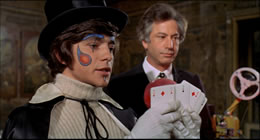 Even if director Radley Metzger had only made The Lickerish Quartet and nothing else, he would still be a crucial name in cult filmmaking. On its own terms as cinema and outside the boundaries of European erotica, this remarkable film operates on levels of narrative gamesmanship, visual architecture, and technical virtuosity that put most modern films to shame. Many illusion versus reality studies tend to fall flat on their own pretentious derrieres, but this, along with 8 1/2, The Stunt Man, and Last Year at Marienbad, is one of the few exceptions. Along with Camille 2000, this represents Metzger and his Aubudon Films at the peak of their powers, operating with artistic freedom in amazing European locales with a stellar cast.
Even if director Radley Metzger had only made The Lickerish Quartet and nothing else, he would still be a crucial name in cult filmmaking. On its own terms as cinema and outside the boundaries of European erotica, this remarkable film operates on levels of narrative gamesmanship, visual architecture, and technical virtuosity that put most modern films to shame. Many illusion versus reality studies tend to fall flat on their own pretentious derrieres, but this, along with 8 1/2, The Stunt Man, and Last Year at Marienbad, is one of the few exceptions. Along with Camille 2000, this represents Metzger and his Aubudon Films at the peak of their powers, operating with artistic freedom in amazing European locales with a stellar cast.
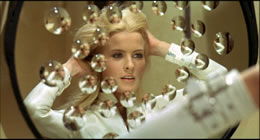 Frank Wolff (an American-born Eurosleaze veteran of such titles as Cold Eyes of Fear and The Great Silence) and the austere Erika Remberg (the bitchy big top diva from Circus of Horrors) are an unhappily married couple spending their time in a vast, deserted castle with Remberg's petulant son, Paolo Turco. One evening the three sit around watching a scratchy B&W stag reel on Wolf's 16mm projector and are taken with a blonde beauty (the insanely gorgeous Silvana Venturelli, coming off her memorable cuffs-and-cages stint in Camille2000) in the film. Afterwards they embark to a carnival where a young woman performs a gravity-defying motorcyle stunt called the "Wall of Death." When she removes her helmet, she looks just like the woman in the film... but with brown hair. Wolff conspires to lure the woman back to the castle and surprise her with the film, but upon doing so, they find that the film has inexplicably changed so that the actress' face is no longer visible. Venturelli stays the night, and the following day, she takes amorous turns with each family member before the surprising finale.
Frank Wolff (an American-born Eurosleaze veteran of such titles as Cold Eyes of Fear and The Great Silence) and the austere Erika Remberg (the bitchy big top diva from Circus of Horrors) are an unhappily married couple spending their time in a vast, deserted castle with Remberg's petulant son, Paolo Turco. One evening the three sit around watching a scratchy B&W stag reel on Wolf's 16mm projector and are taken with a blonde beauty (the insanely gorgeous Silvana Venturelli, coming off her memorable cuffs-and-cages stint in Camille2000) in the film. Afterwards they embark to a carnival where a young woman performs a gravity-defying motorcyle stunt called the "Wall of Death." When she removes her helmet, she looks just like the woman in the film... but with brown hair. Wolff conspires to lure the woman back to the castle and surprise her with the film, but upon doing so, they find that the film has inexplicably changed so that the actress' face is no longer visible. Venturelli stays the night, and the following day, she takes amorous turns with each family member before the surprising finale.
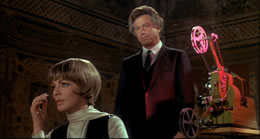 Beautifully shot and enhanced with razor sharp editing (including many disorienting cross cuts between time and space), The Lickerish Quartet is a beguiling combination of Teorema and The Twilight Zone, that rare film that not only benefits from repeated viewings but actually requires them.
Beautifully shot and enhanced with razor sharp editing (including many disorienting cross cuts between time and space), The Lickerish Quartet is a beguiling combination of Teorema and The Twilight Zone, that rare film that not only benefits from repeated viewings but actually requires them.
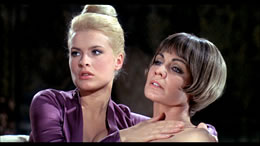 performed some additional color correction and looked better, with the entire film uniformly matted at 1.85:1 to prevent those jarring shifts in aspect ratio (a la most Stanley Kubrick titles). The same transfer was then rehashed in Australia by Umbrella for their DVD release, which was also packed into a Metzger box set.
performed some additional color correction and looked better, with the entire film uniformly matted at 1.85:1 to prevent those jarring shifts in aspect ratio (a la most Stanley Kubrick titles). The same transfer was then rehashed in Australia by Umbrella for their DVD release, which was also packed into a Metzger box set.